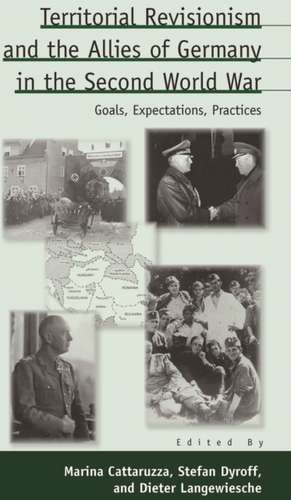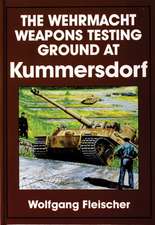Territorial Revisionism and the Allies of Germany in the Second World War: Austrian and Habsburg Studies, cartea 15
Autor Marina Cattaruzza Editat de Stefan Dyroffen Limba Engleză Hardback – 30 noi 2012
Din seria Austrian and Habsburg Studies
- 14%
 Preț: 690.65 lei
Preț: 690.65 lei -
 Preț: 223.05 lei
Preț: 223.05 lei -
 Preț: 223.50 lei
Preț: 223.50 lei -
 Preț: 225.45 lei
Preț: 225.45 lei - 23%
 Preț: 749.77 lei
Preț: 749.77 lei - 23%
 Preț: 806.98 lei
Preț: 806.98 lei - 23%
 Preț: 862.01 lei
Preț: 862.01 lei - 23%
 Preț: 803.59 lei
Preț: 803.59 lei -
 Preț: 218.99 lei
Preț: 218.99 lei -
 Preț: 301.20 lei
Preț: 301.20 lei - 23%
 Preț: 993.41 lei
Preț: 993.41 lei -
 Preț: 151.22 lei
Preț: 151.22 lei - 23%
 Preț: 805.68 lei
Preț: 805.68 lei - 23%
 Preț: 751.41 lei
Preț: 751.41 lei - 23%
 Preț: 749.32 lei
Preț: 749.32 lei - 23%
 Preț: 751.25 lei
Preț: 751.25 lei -
 Preț: 261.93 lei
Preț: 261.93 lei -
 Preț: 258.88 lei
Preț: 258.88 lei - 23%
 Preț: 747.99 lei
Preț: 747.99 lei -
 Preț: 258.07 lei
Preț: 258.07 lei -
 Preț: 259.80 lei
Preț: 259.80 lei -
 Preț: 263.29 lei
Preț: 263.29 lei -
 Preț: 262.52 lei
Preț: 262.52 lei - 23%
 Preț: 752.88 lei
Preț: 752.88 lei -
 Preț: 263.47 lei
Preț: 263.47 lei - 23%
 Preț: 750.49 lei
Preț: 750.49 lei -
 Preț: 260.96 lei
Preț: 260.96 lei -
 Preț: 260.41 lei
Preț: 260.41 lei -
 Preț: 259.80 lei
Preț: 259.80 lei -
 Preț: 293.29 lei
Preț: 293.29 lei
Preț: 748.14 lei
Preț vechi: 971.61 lei
-23% Nou
Puncte Express: 1122
Preț estimativ în valută:
143.20€ • 155.60$ • 120.37£
143.20€ • 155.60$ • 120.37£
Carte tipărită la comandă
Livrare economică 21 aprilie-05 mai
Preluare comenzi: 021 569.72.76
Specificații
ISBN-13: 9780857457387
ISBN-10: 0857457381
Pagini: 224
Dimensiuni: 152 x 229 x 14 mm
Greutate: 0.47 kg
Editura: BERGHAHN BOOKS INC
Seria Austrian and Habsburg Studies
ISBN-10: 0857457381
Pagini: 224
Dimensiuni: 152 x 229 x 14 mm
Greutate: 0.47 kg
Editura: BERGHAHN BOOKS INC
Seria Austrian and Habsburg Studies
Notă biografică
Marina Cattaruzza is Professor of Modern and Contemporary History at the University of Bern. Her recent publications include L'Italia e il confine orientale [Italy and its Eastern Border] (3rd ed, 2011); Sozialisten an der Adria - Plurinationale Arbeiterbewegung in der Habsburger Monarchie [Socialists on the Adriatic - Multinational labor movement in the Habsburg Monarchy] (2011). Stefan Dyroff has been Lecturer and Research Rellow at the Department of Contemporary History at the University of Bern since 2006. His current research project, "International politics between diplomacy and a semi-official gray area. The importance of state and social actors for the supervision of minority protection by the League of Nations," is funded by the Swiss Research Council. Dieter Langewiesche was Professor of Modern History at the University of Hamburg from 1978 to 1985 and of medieval and modern history at the University of Tubingen from 1985 to 2008. He has been awarded the Gottfried Wilhelm Leibniz Prize by the German Research Foundation. He is member of the Heidelberg Academy of Sciences and Humanities and the German National Academy of Sciences Leopoldina. His recent publications include Reich, Nation, Foderation. Deutschland und Europa [Empire, Nation, Federation - Germany and Europe] (2008); Zeitwende. Geschichtsdenken heute [Times of Transition. How do we think history today?] (2009).
Cuprins
Introduction: Contextualizing Territorial Revisionism: Goals, Expectations, Practices Marina Cattaruzza and Dieter Langewiesche * The European Scenario in the Interwar Period * Revisionism in Practice * The Minorities Issue * The manifold problems of the heirs of the empires in East Central Europe * An era of Revisionism? Chapter 1. The Worst of Friends: Germany's Allies in East Central Europe - Struggles for Regional Dominance and Ethnic Cleansing, 1938-1945 Istvan Deak THE ROLE OF MINORITIES Chapter 2. Minorities into majorities. Sudeten German and Transylvanian Hungarian political elites as actors of revisionism before and during the Second World War Franz Horvath * Introduction * Some remarks on terminology (Minority groups, Revisionism, and Loyalty) * Sudeten Germans and Transylvanian Hungarians as Revisionist Minorities * Dominating the others. Sudeten Germans and Transylvanian Hungarians as Members of the Ruling Nation (1938/40-1944/45) * Conclusion Chapter 3. Germany turns eastwards: The "Volksdeutsche" in Central and Eastern Europe Norbert Spannenberger * Minority Politics and German "Volksgruppen" in the States of the South Eastern European Region * A Sketch of National Socialist Volksgruppen Politics in Practice REVISIONISM AS A DRIVING FORCE Chapter 4. Revisionism in Regional Perspective Holly Case * Revisionism as Ideology * Revisionist and Anti-Revisionist Solidarity: The Case of the Little Entente * Lessons and Models in the Geopolitics of Revisionism: Bulgaria and Romania * Revisionism and Domestic Policy * Conclusion Chapter 5. Hungarian Revisionism in Thought and Action, 1920-1941 (Plans, Expectations, Reality) Ignac Romsics * Hungarian Revisionist Conceptions after Trianon * Hungarian Revisionist Politics by Negotiation and War Chapter 6. Bulgarian Territorial Revisionism as the Driving Force for its Rapprochment with the Third Reich Elzbieta Znamierowska-Rakk * Postwar Revisionism and Postwar Alliances * Germany as the Main Revisionist Power * The Recovery of Southern Dobrudja * Bulgaria's Accession to the Pact of Three * Conclusion PRACTICES OF REVISIONISM Chapter 7. Politics and Military Action of Ethnic Ukrainian Collaboration for the "New European Order" Frank Grelka * Political Collaboration * Administrative Collaboration * Military Collaboration * Conclusion Chapter 8. Civil War in Occupied Territories: The Polish-Ukrainian Conflict in the Interwar Years and in the Second World War Frank Golczewski * National Disappointment * Hopes set on the Great Powers * The Changes of 1941 * The Change of the Tide * After the War Chapter 9. The Internal Macedonian Revolutionary Organization and Bulgarian Revisionism, 1923-1944 Stefan Troebst * Vision turned into Politics: The Bulgarian Syndrome of San Stefano * Peaceful Revisionism": Official Bulgarian Foreign Policy in the Interwar Period * Militant Revisionism: Informal Bulgarian Interwar Balkan Policy * Revision Achieved - And Lost Again: Bulgaria and IMRO in the Second World War * Legacies: IMRO in Today's Bulgarian and Macedonian Politics Chapter 10. Romania in the Second World War: Revisionist Out of Necessity Mariana Hausleitner * Minorities Policies, Romanization and anti-Semitism in Romania 1918-1941 * The Redrawing of the Romanian Borders 1938-1940 * The so called "Purification" in the Bukovina, Bessarabia and Transnistria 1941-1944 * Who planned and organized the "national purification" of Romania * Conclusion Bibliography Index
Recenzii
"This is an excellent topic, clearly defined and illuminated by some first rate articles. This volume will contribute to the scholarly literature on the Second World War (which often neglects the smaller participants), but will also enrich discussions among historians and social scientists on that key tension between states and nations." * James Sheehan, Stanford University "The authors are to be commended for their original research and analysis - In addressing the opportunistic goals, motives, and prejudices of revisionist elites seeking territorial gain in fragile interwar nation-states, the book makes a key contribution to the comparative and transnational history of modern East Central Europe." * Steven Seegel, University of Northern Colorado














